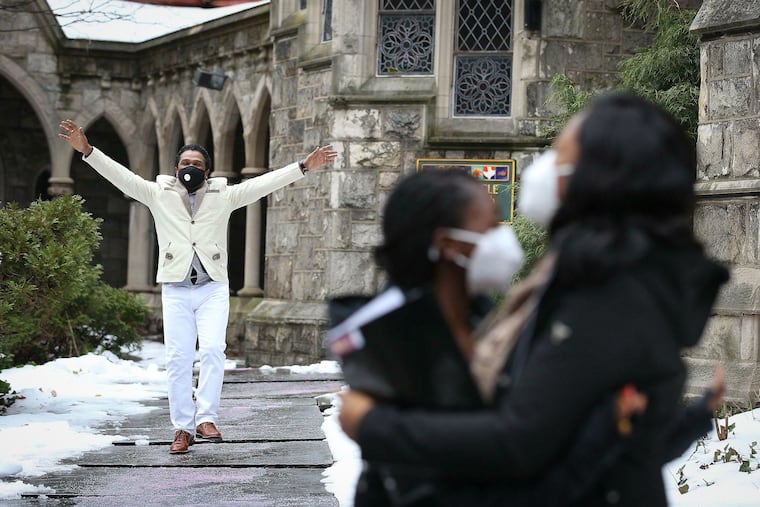Allowing ICE to arrest people in ‘sensitive locations’ would violate faith traditions and sacred spaces
Faith communities do not just provide a place to worship. They stand in a prophetic tradition thousands of years old, where God calls us to speak out against injustice.

Last week, NBC reported that the Trump administration plans to scrap the “sensitive locations” memo that prevents Immigration and Customs Enforcement from arresting people in places of worship, schools, hospitals, and public events like weddings or protests. This policy has been in place since 2011, and rescinding it will send a chill through not only immigrant communities, but also clergy, teachers, and health-care workers. It says that a child getting an education, a grandmother seeking medical care, or a family sitting in prayer are all open game for ICE.
All of these spaces must remain safe from ICE, but it is especially sinister to say ICE can enter places of worship. Congregations are sacred places. They are where so many in our city — both immigrant and native-born — come to worship, to find solace and hope, and to find community. They are centers of education that provide vital services and hold a trusted space for culture, celebrations, and mourning.
To take away protections from these spaces is to tear away at our core social fabric, what binds us together. Ending this policy violates our religious traditions, and is no surprise given the Trump administration’s plans for immigration.
President-elect Donald Trump, deputy chief of staff Stephen Miller, and “border czar” Tom Homan have already torn up our Scriptures with their plan to persecute, arrest, and deport tens of thousands of our neighbors in Philadelphia, and millions of people across the country. You cannot love your neighbor as yourself and deport millions of people. You cannot welcome the stranger and close the border, build new detention centers, or institute a Muslim ban.
The Trump administration has already trampled our faith teachings and our values, and rescinding this memo would now allow them to trample our sacred spaces.
Faith communities do not provide just a place to worship or services.
But the Trump administration does not define our sacred spaces by a memo.
Faith communities do not provide just a place to worship or services. They stand in a prophetic tradition thousands of years old, in which God calls us to speak out against injustice. This tradition is older than the “sensitive locations” memo. And it is older than President Trump, Miller, and Homan combined. Prophets and people of faith have stood up to, and spoken out against, pharaohs, kings, and caesars for thousands of years. And today as well, we will act in this tradition to fight Trump’s attempt to arrest, detain, and deport our neighbors.
We don’t need permission from a memo to do this sacred work.
Our buildings themselves carry an ancient history of sacredness, of refuge, of sanctuary. In the Judeo-Christian tradition, God directed the Israelites to set aside three cities of sanctuary when someone needed protection from unjust retribution. This tradition continued into the Middle Ages of Europe, where someone would cling to the altar, ring a bell, or even cling to a bishop to find safety from unjust prosecution.
The U.S. carries this history, as well. Congregations were a key part of the Underground Railroad, offered returning soldiers from Vietnam a sanctuary so they could be conscientious objectors, and in the 1980s, faith communities worked in solidarity with those fleeing U.S.-supported repressive regimes in Central America to protect their lives as well as change U.S. foreign policy.
We can be a physical breach between the sacred and ICE simply by not letting ICE enter our buildings.
None of these actions relied on a memo from ICE. They moved in the breach between God’s call for justice and violent U.S. policy and practice. And so today, congregations, religious leaders, and laypeople stand in that breach.
We can be a physical breach between the sacred and ICE simply by not letting ICE enter our buildings. Congregations are private property, and the Fourth Amendment requires ICE to have a warrant signed by a judge. Clergy and religious workers should be reviewing these rights and training staff on how to defend them in the face of ICE.
» READ MORE: Three steps to take now to fight back against Trump’s planned mass deportations | Opinion
We can also take broader prophetic action.
In Philadelphia, faith communities have been a core part of the movement for immigrant justice. In 2013, we launched a 40-day fast to pressure former Mayor Michael Nutter to block collaboration between Philadelphia police and ICE.
The next year, after years of work from organizations and faith communities, we won one of the best sanctuary city policies in the country.
In 2016, to stop anti-immigrant legislation in Harrisburg, clergy and laypeople held an all-night prayer vigil during heavy rain and wind.
In 2021, we brought bread and fish to Sen. Bob Casey and Rep. Mary Gay Scanlon, symbolizing the economy of abundance when Jesus multiplied five loaves of bread and two fish to feed thousands of people, and called on legislators to provide a pathway for all undocumented people.
And Philadelphia congregations opened their doors for physical sanctuary under Presidents Barack Obama and Trump as we fought to stop the deportation of four families and to challenge anti-immigrant policies.
If Trump rescinds this memo, congregations in Philadelphia will still be prophetic voices and still take prophetic action.
Our traditions, our teachings, and our consciences leave us no other choice.
Peter Pedemonti is one of the founding members and the codirector of the New Sanctuary Movement of Philadelphia.